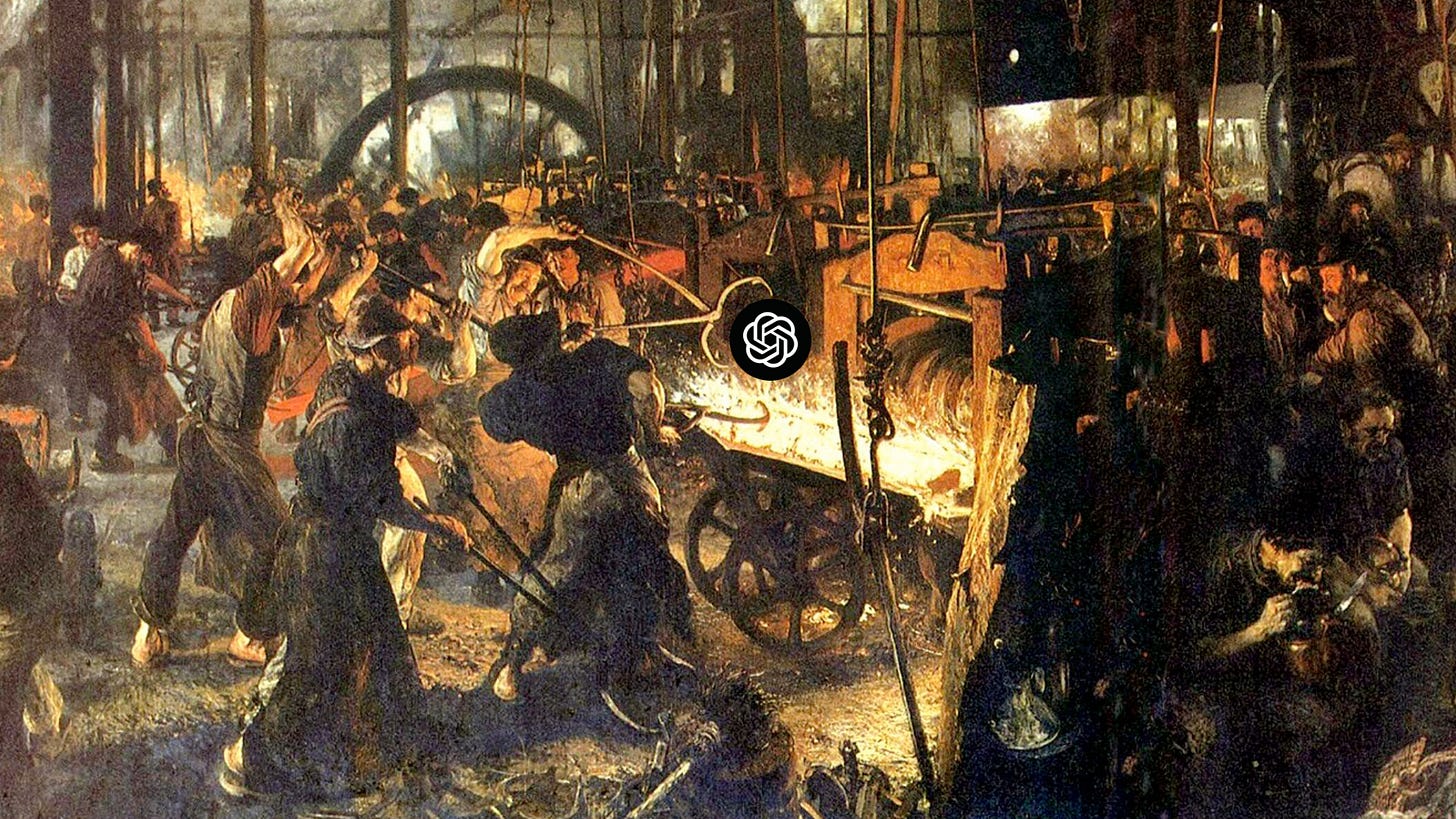The great AI job swindle
Or how the balance between cost and convenience will forever ruin work
Like it or not, artificial intelligence isn’t going anywhere. And — somehow even worse than that — people like it. Lots and lots of people.
You can gnash and yap about how this reflects on society, but the key point is this: the world is using AI tools and will continue to do so. All it takes a brief glance online to see how widespread it already is.
Consider, for example, this piece in The Guardian revealing how many people are already using the tech at uni. AI is a fact of life — you can fight against it, but the war is already over.
What we really need consider is how this widespread use will impact society, specifically the unintended consequences of this shift. There are a deluge of these out there, but, today, I want to focus on one that’s been on my mind: the impact on the job market.
One of my key beliefs is that much of human behaviour can be explained through the concept of ease. People want convenience. If you look at many cultural shifts in recent years, many of them have ease as a core driver. People don’t necessarily like change, but will adopt it wholeheartedly if it’s easier than before.
Piracy is an interesting example. Back in the day, it was very tough to, say, get movies online. You had to go to a shop and buy them, or head to the cinema. This led to an explosive growth in piracy.
Yet, as streaming services have made watching movies and TV simpler, doing so illegally has dropped. In the EU, for example, film piracy decreased by about 25% in 2023.
For swathes of people with stable jobs, it’s easier to sign up to Netflix or Disney+ than it is to wade through understanding how a torrent works.
This is a key driver in the adoption of artificial intelligence large language models (LLMs) like ChatGPT too. They’re easy. They’re convenient. Why would people bother writing an essay or job application when a machine can do it for them in seconds? Why trawl through an endless parade of SEO-written articles on Google to work something out when ChatGPT can give you a straightforward answer?
Yet ease as an influence on how people behave doesn’t exist in a vacuum. Instead, it’s ebbing and flowing against another concern: money.
Yes, humans are driven by what’s most convenient, but there comes a point where the cost of a service outweighs its effortlessness. Sports piracy is a good example .
It’s been reported that, in the UK, the cost to watch all major football competitions went up from £89.23 in the 19/20 season to £140.21 in 24/25. That’s close to a 60% increase in five years.
The easiest way to watch football is via official means, but the cost of doing so outweighs this convenience. A recent report from Enders, for example, declares that pirated feeds account for a “double digit percentage” of premium sports viewing. Although it’s understandably tough to get solid information on this, it’s clear that sports piracy is rising — and price is a key driver.
Convenience and cost, then, are in a constant balancing act.
I’m bringing this up because, in the workplace, AI models have the potential to deliver both things. And that should terrify you.
The biggest impact AI will have on the working world is on entry-level jobs and, unless properly dealt with, this will lead to a crisis.
Here’s the rough theory. The general way to get a career is by being a bit crap.
Take me for example. I didn’t emerge from the womb a professional writer. Outside of doing it for my own enjoyment, I began my career by getting an entry-level job and being lucky enough to have an array of people to teach me.
In those days, my writing would often be overly verbose, loosely structured, and unable to actually get to the fucking point. My boss would then work with me to edit that into something approaching readability.
Without that experience, I wouldn’t have gained the skills I have today.
This has been the same across all manner of industries for time immemorial. You begin sucking, learn the ropes from an older colleague, and slowly become useful until you’re able to teach someone else. It’s a cycle that works and is beneficial.
The problem is this is neither convenient nor cheap.
Not only do you have to hire someone full time to do an entry-level role, a senior person has to spend their time editing them. I’ve done this for different people and, although it’s rewarding in the long term, it’s tougher in the moment. You’re busy with your own work and it’s inconvenient to have to handhold someone who’s just getting started.
To the casual observer, then, artificial intelligence is a blessing.
Why pay an entry-level coder or writer or marketer when ChatGPT can throw up a passable example of work a senior professional can edit at any time they want? It’s cheaper and more convenient.
Indeed, the market is taking notice of this opportunity. Between 2022 and 2023, there was a 38% drop in entry-level job postings in the US. The problem, as always though, is the short-sightedness of this approach.
Not hiring people for entry-level roles works now. It’ll work for the next few years, but there’ll come a point when the entire ecosystem breaks. There won’t be anyone learning and progressing and there’ll be a vacuum of skilled editors to shape the slop AI produces.
This would be fine if AI tools get as good as experts — but I severely doubt that’ll actually happen.
One element of artificial intelligence that isn’t often spoken about is its ceiling. Although we’ve seen amazing leaps and bounds in recent years, there’s a growing amount of research that suggests we’re hitting a plateau of what LLMs and the like are capable of.
Effectively, the big gains may well have been made and taking a further leap will require huge amounts of processing power for increasingly diminishing returns. But those returns are important to produce high-quality work.
We can see it a bit with self-driving cars. Technically, they work. San Francisco has a fleet of them, but they basically only exist in that city. Many experts believe that we won’t really see the technology become widespread in our lifetimes.
Part of this is regulatory pressures, but another part of it is making a self-driving car that can go anywhere is much, much harder than it seems. Although they can drive in cities that are completely mapped, venturing into the big, wide world is so much more complex.
What we can perceive as a small difference (i.e. driving in the countryside compared to a city) is much bigger in computing terms.
To reposition that, artificial intelligence will likely remain a middling writer, rather than an excellent one. The low-hanging fruit has been plucked: AI is better at writing and coding than most people, but it’s far, far away from being an expert. That’s an exponential curve.
If you want to give AI a single prompt and get a perfect app, website, or blog post, those days aren’t coming any time soon.
But let’s return to the job market.
If there are fewer and fewer entry-level people being hired, then there are fewer people being trained and becoming true experts. AI-created work needs these experts to be useful and, without them, a chasm opens up.
This skill gap might not be noticeable now, or even 10 years from now, but further down the line it will become be a huge problem.
Thinking and learning will have been outsourced to AI that’s simply not good enough to do it at the cutting-edge.
Really, it’s hard to blame humans for using these tools. They’re easy and cheap. But what you can blame are companies that take this shortcut, because all they’re doing is kicking a problem down the road for short-term gain.
So hire real people to do entry-level jobs. Otherwise, you may not even have a company in the future.






